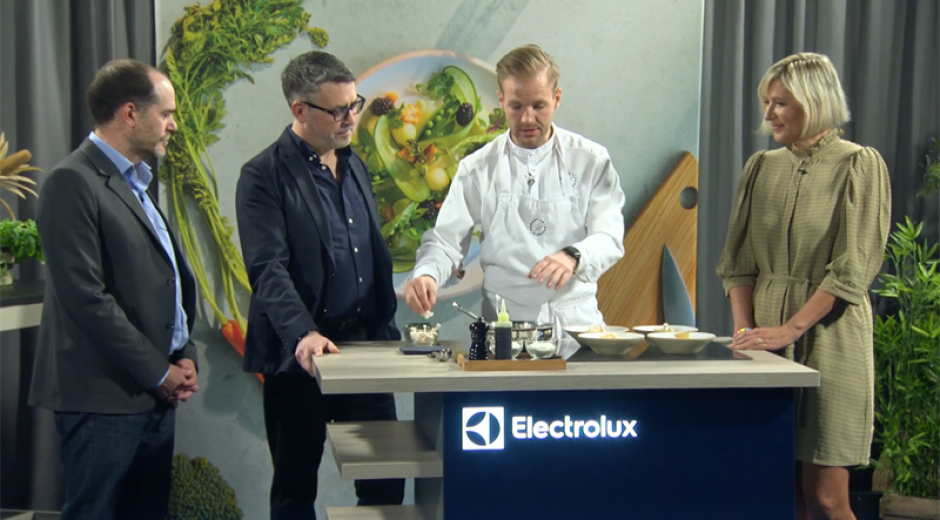The whole food ecosystem must work together to nudge consumers towards making healthier and sustainable choices instead of judging their behavior, said panelists at the recent Electrolux’s Future Sustainable Kitchen (FSK) event.
“There are so many innovators showing that with the right amount of knowledge, right amount of nudging, we can really make a difference that’s meaningful for the planet and for our future,” said Electrolux CEO Jonas Samuelson. ”If today has shown anything, it’s really the power of partnership in the food ecosystem.”
FSK’s third edition gathered online leading experts from across the food ecosystem – scientists, kitchen producers, food tech start-ups, and a chef. Among them is Petra Janney, founder of sustainability consultancy firm Hatcher, who said companies should put the right choices in front of consumers. “We have to stop judging our consumers for failing to act, and instead nudge them in the right direction by making sustainable choices magnetic,” she said. This means companies should find out what matters to consumers, link their identity to sustainable action, and make eating diverse, plant-based foods the new social norm. In the process, companies can create “irresistible offerings” based on shared experiences for families and friends. “Eating sustainably is not a sacrifice: it’s an opportunity to learn something new, to try something delicious, and to create an unforgettable moment with loved ones,” Janney added.
Making sustainable choices also includes changing the way we treat surplus food. “What most people don’t realize is how bad food waste is for the environment – greenhouse emissions from one kilogram of food waste is equivalent to landfilling 25,000 500ml plastic bottles,” said Tessa Clarke, co-founder of Olio, a mobile app enabling people and local stores to share surplus food. Citing data from Project DrawDown*, she said that for a 2°C warmed world the top solution is reducing food waste, even above electric cars, solar power, and a plant-based diet.
Equally important is offering consumers appliances with less impact on the environment. “Our Life Cycle Analysis has shown that globally around 85% of the CO2 emissions from the appliance come from the usage phase, when the products are in consumers’ home and in use every day,” said Sarah Schaefer, VP Sustainability at Electrolux in Europe. “This means that we are constantly looking at more efficient and circular ways to make our appliances ‘greener’ so we can help consumers reduce their environmental footprint.”
To aid consumers, companies can show through stories “how to use the product, its eco functions, the auto dosage, and, ultimately, how to reduce food waste,” said Tommy Myhre, Category Director at Nordic consumer electronics retailer Elkjøp.
At this year’s EuroCucina in Milan (June 7-12), Electrolux will unveil GRO – a visionary concept aimed at reinventing the kitchen and enabling people to enjoy food in a way that is sustainable for our health and the planet. Watch this space for more information.
About the Future Sustainable Kitchen
The annual Future Sustainable event, presented by Electrolux, gathers representatives from across the food ecosystem to discuss and discover how we together can make healthy and sustainable eating the preferred choice.
Making sustainable eating the preferred choice by 2030
Making healthy and sustainable eating the preferred choice is part of our Better Living action plan for shaping better and more sustainable living around the world. The actions support our goals within the domains of better eating, better clothing care, better wellbeing at home, as well as better company. Better Living forms part of our broader sustainability framework – For the Better 2030.
Find out more about our completed and ongoing actions for better and more sustainable living under: https://www.betterlivingelectrolux.com/


